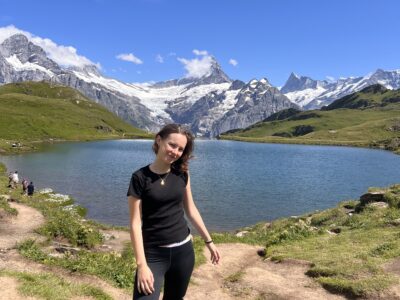Earth Institute undergraduates Karina Robles (SusDev ’18) and Jesse Thorson (SusDev ’18) attended the 2017 Planet Forward Summit at George Washington University in Washington, D.C. in April.

We had no idea what to expect, but with compelling communicators in place of dusty-jacketed academics delivering overly routine research presentations, the 2017 Planet Forward Summit did not disappoint.
The Summit began with a keynote presentation from James Gilbey, Creative Director with Discovery Communications. The conference emphasized the importance of storytelling — an activity in which Gilbey was an expert. Gilbey offered a close look at how to construct a meaningful story through the use of video. He showed video campaigns and advertisements from all around the world to demonstrate that though storytelling is universal, good storytelling is an art form. The presentation struck a chord with Karina Robles, who finds that one of the most frustrating aspects about studying sustainable development is the persistent denial of climate change from specific demographics. Gilbey spoke about creating authentic human connections through storytelling via video, which can be an effective means for communicating climate science. One of the examples he gave was of a campaign which called for Facebook to divest from fossil fuels. The child narrator, along with some surprisingly effective, animated crayon drawings, showed that climate change is not only a problem for the current generation, but for all future children. The campaign was successful. Facts and figures only go so far — we need to relate to people’s emotions when we tell the story of climate change.
The breakout sessions proved very relevant to the students’ shared environmental interests and Sustainable Development coursework. Jesse Thorson elected to attend a handful of panels focusing on the power of narratives to induce change and, specifically, the barriers to effective scientific communication. His favorite breakout session, ‘Communicating Amid Complexity,’ was held on the final day of the conference and entailed an interesting discussion between Barret Pitner (The Daily Beast), Paul Hirsch (SUNY-ESF), Holly Butka (Monsanto), and Charla Lord (Monsanto). They addressed the need for an honest embrace of complexity in today’s sociopolitical, environmental atmosphere. Because the panelists represented a multiplicity of environmental actors and stakeholders (and even some competing interests), the breakout session yielded a stimulating acknowledgement of not only the hard questions posed by climate change, but also the lack of straightforward, dualistic, black-and-white answers. Reflecting upon these issues brought to mind the importance of paying attention to the variety of societal narratives to which we varyingly adhere, whether political, cultural, ethical or religious. During the breakout session, Thorson was able to contribute some of these thoughts to the panelists and audience, which he considers to be one of many rich experiences he had at the Summit.
Additionally, the networking opportunities consistently produced diverse, fruitful conversations. From chemical engineers to fellow undergraduates, from an Our Children’s Trust plaintiff to Google’s sustainability lead, Thorson and Robles were able to make friends and establish professional connections with a diverse mix of students, scholars, and industry representatives from around the country. For them, the most meaningful part of the conference was the opportunity to engage in constructive, collaborative dialogue with people that have much more experience than two undergraduates.
Thorson and Robles thank Frank Sesno and the Planet Forward Advisory Board for planning the summit, as well as the Earth Institute’s Undergraduate Program in Sustainable Development for sponsoring their participation.



